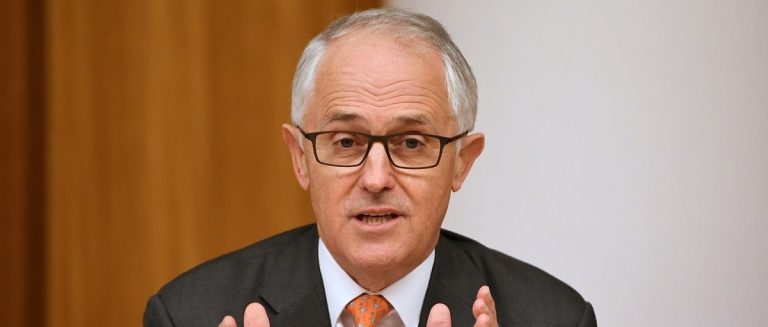
The Turnbull government is seeking to seize the political initiative on schools, with a substantial funding injection and the appointment of David Gonski – who delivered the 2011 landmark schools report – to chair a “Gonski 2.0” review on how to improve the results of Australian students.
A day after announcing university students will pay more for their education, Turnbull unveiled an extra AUD18.6 billion in funding to Australian schools over the next decade, including more than AUD2.2 billion in this budget for the first four years.
Turnbull said under the government’s plan, “every school will receive Commonwealth funding on a genuine needs basis”.
At a joint news conference with Turnbull and Education Minister Simon Birmingham, Gonski – who is Turnbull’s personal friend – said he was very pleased the government accepted the fundamental recommendations of the 2011 report, particularly the needs basis. The proposed injection of money was “substantial”, he said.
https://twitter.com/adam_surmacz/status/859341126955786244
Turnbull and Birmingham said the plan would ensure all schools and states moved to an equal Commonwealth share of the Gonski-recommended Schooling Resource Standard in a decade. The federal government would meet a 20 percent share of the standard for government schools, up from 17 percent this year, and 80 percent for non-government schools (currently 77 percent).
Birmingham said 24 non-government schools stood to lose money (there would be some transition money for a couple of these schools with a large number of students with special needs). In addition, there are some 353 presently over-funded schools that will be worse off under the plan than they would otherwise have been. Australia has more than 9,000 schools across the government, Catholic and independent sectors.
Pete Goss, the school education programme director at the Grattan Institute, said: “We still need to understand all the details but the overall shape of the package is very encouraging.
The minister has set a clear 10-year goal of getting every school funded consistently by the Commonwealth. The additional funding will help ease that transition.”
“Some schools that have been on a great wicket for a long time will lose out – and so they should. This is a gutsy call and it is the right call.”
Goss said he understood there had been “an internal debate” in the government to arrive at this plan.
The announcement is a major and surprising turnaround for the government, which had previously planned more modest funding and refused to embrace the final two years of Gonski.
But Turnbull was in full Gonski mode on Tuesday: “This reform will finally deliver on David Gonski’s vision, six years ago, after his landmark review of Australian school education,” he said.
Turnbull is trying to take some of the shine off Labor’s political advantage on education which, with health, was at the heart of its 2016 election campaign. Next week’s budget will attempt to neutralise some of the Coalition’s problems on health, which saw Labor run its “Mediscare” at the election.
Birmingham said over the next four years there would be growth in Commonwealth funding of some 4.2 percent per student across Australia – “importantly, most of it geared into the government sector where need is greater and the gap to close in terms of Commonwealth share is larger”.
He said the government would legislate the decade-long programme and impose conditions to ensure states did not lower their funding. “We will be expecting states to at least maintain their real funding,” he said.
“This is about real extra money to help Australian schools and students.”
What Turnbull dubbed the “Gonski 2.0” review will recommend on “the most effective teaching and learning strategies to reverse declining results and seek to raise the performance of schools and students”.
It will advise on how the extra Commonwealth funding “should be used by Australian schools to improve student achievement and school performance”, Turnbull and Birmingham said in a statement.
The government flagged the schooling money to the states would depend on their signing up to reforms resulting from the Gonski review.
Another member of the original Gonski panel, Ken Boston, will also be on the review, which will report to Turnbull in December.
The government says its new arrangements will replace the patchwork of agreements left by Labor.
But Opposition leader Bill Shorten said “schools will be AUD22 billion worse off under Turnbull than they would have been under Labor”.
Labor education spokesman Tanya Plibersek said this was “a smoke and mirrors, pea and thimble effort to hide the fact instead of cutting AUD30 billion from schools over the decade, this government will cut AUD22 billion from schools over the decade”.
“The big picture here is that in the 2014 budget, Tony Abbott promised an AUD30 billion cut to our schools and in the 2017 budget, Malcolm Turnbull wants a big pat on the back for changing that cut to AUD22 billion,” she said.
“A week out from the federal budget this is taking out the trash,” she said. “They want clear air on budget night.”
By Michelle Grattan, Professorial Fellow, University of Canberra
This article was originally published on The Conversation. Read the original article.![]()
Liked this? Then you’ll love these…
Australia: Student journos cry foul after being barred from Budget lock-up
Australia: Fee hikes in universities as govt prepares to slash funds







